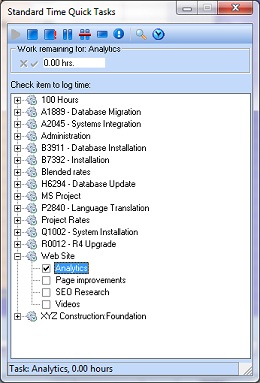The sooner employees record actual hours worked, the more accurate they will be. Some companies require team members to record their project hours. Sometimes this is for client billing, other times for engineering or manufacturing projects. Whatever the reason, I’ve seen firsthand that recoding hours soon after the actual event ensures accuracy.
Most people cannot remember what they did last week. So if asked to fill in their timesheet for last week, they will not be able to pick out individual tasks. Sure, they remember which projects they worked on, unless there are more than two. But they cannot reliably remember which tasks. It gets impossible when asked to assign actual hours to those tasks. That is the primary reason DCAA (Defense Contract Audit Agency) requires timekeeping every day. Even filling out timesheets at the end of the week is against the rules. I don’t normally like government agencies, but in this case there is truth to their overbearing policies.
Standard Time® is an example of a professional timesheet with a built-in timer. The image below illustrates the Quick Task window. A link to a video is also included.

In the Standard Time Quick Task window, you simple click project tasks to start and stop the timer. Time log records are automatically entered into the timesheet. That solves the problem of entering hours after the work is finished. Actual work is sent directly to the timesheet; there is no delay. And since you are clicking the checkbox to start and stop a timer, the actual work is as accurate as it could possibly be.
Most companies do not require minute-by-minute accuracy, unless you are charging them for time worked. Only consulting companies really need this level of granularity. For them, it’s much easier to justify invoices when the time accounting accuracy is beyond impeachment. Simply print out the actual time log report (with records down to the second) and there is no disputing the accuracy. Of course you can still milk the clock, but consultants are rarely accused of that. But still most manufacturing companies that track projects for earned value purposes don’t need timer accuracy.
Whether your company needs timer accuracy, daily accuracy, weekly, or monthly, tracking time is almost always a good thing. There is so much value in knowing how much time projects take. Consider a few good reasons: comparing estimates to actuals, estimating future projects, assigning cost and estimates to new activities, or even know what employees are up to – all good things!
�